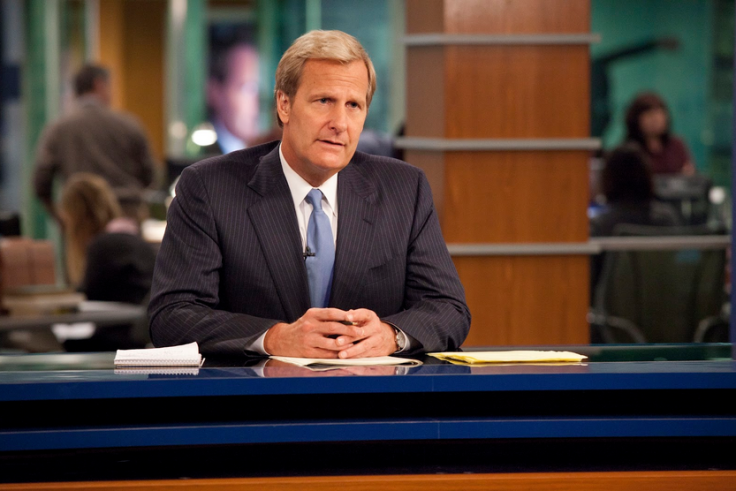Why Journalists Hate 'The Newsroom'; Workplace Dramas Face Pushback From Insiders

“The Newsroom,” which concluded its third and final season Sunday, was anything but universally praised. Though exciting and widely watched, the HBO series constantly had to fend off criticism of everything from the melodrama of the characters’ personal lives to the questionable content of certain storylines. However, some of the harshest criticism has come from journalists, the profession the show seeks to exemplify, a counterintuitive but common symptom among workplace dramas.
Just as journalists have gone after the “Newsroom,” doctors have taken shots at “Grey’s Anatomy” and “ER” and cops have called out, well, countless police dramas over the years. The most obvious source of criticism is inaccuracy.
And inaccuracy is not hard to find. Police dramas famously oversimplify the extent to which forensics can provide a quick fix to a perplexing case and present a reductive representation of the criminal justice system. Doctors and medical residents have often criticized medical dramas, such as ABC’s still popular “Grey’s Anatomy,” for similar inexactitudes, including playing fast and loose with the accuracy of real-life medical procedures and ignoring the very important chain of command and seniority present in an actual hospital.
While the same criticisms could be levied against “The Newsroom,” the show also gets a lot right. Many have noted the truthful depiction of a broadcast television newsroom, with producers glued to Avid boards and racing to get in last-minute stories before the broadcast, as well as an accurate rendering of a control room and the communication between anchors and producers. In fact, for every minute detail shows like “The Newsroom” and “ER” get wrong, they get something else right.
Dr. Ethan Fried, director of the internal medicine residency program at Lenox Hill Hospital, told International Business Times -- citing "ER" specifically -- that "some shows are remarkable in the medical accuracy, the medical language used and the descriptions of some patients."
However, there may be a different inaccuracy responsible for all the insider pushback.
Throughout Season 3 of “The Newsroom,” there was a screwball storyline where a watchdog human resources VP, played by “30 Rock” vet Keith Powell, tried to out the anchor-and-producer romance between Olivia Munn’s Sloan Sabbith and Thomas Sadoski’s Don Keefer. When the two were finally caught in a tender moment, the HR man revealed that there were really no consequences for their dating and he just wanted to entertain himself at work by messing with them.
That plotline highlights the key issue with workplace dramas, besides technical accuracy -- the added unrealistic drama.
In reality, the level of fraternization between colleagues in shows like “The Newsroom” and “Grey’s Anatomy” would not only be inappropriate, but unacceptable. It seems almost tongue-in-cheek that "The Newsroom" threatens consequences for Don and Sloan only to admit it was all for fun.
Regarding "Grey's Anatomy" and other medical dramas where "everyone is jumping in bed together," Fried says, "[residency programs] have a responsibility to the learners. We have to make evaluations and there has to be degree of professionalism to maintain objectivity."
Beyond the romance, the high level of drama infused in the workplace on television for entertainment seems to create misconceptions about the profession for the general public.
Amanda Kirzner, a contributing writer to The DO, an online journal for Osteopaths, wrote that “By ['Grey’s Anatomy'] portraying the residents’ lives as exciting, dramatic whirlwinds, the show makes real-world residency seem less difficult. I would not be surprised if medical students watching the show are shocked and disillusioned when they finally rotate through surgery and find out what the surgical world is really like.”
Fried highlights another misconception. "There is a huge misperception by the public about the success of extreme measures to save lives," he says, referring to the low success rate of instances when patients go into arrest within the hospital, needing CPR or defibrillation, compared with television's depiction of such events. "If a patient goes into arrest in the hospital, it means that something is very wrong. People think it's a given that we will be able to bring them back."
But Fried adds that the shows are "just entertainment" and many doctors get a kick out of watching them, inaccuracies aside.
However, “The Newsroom,” with its look at journalists, takes things a bit further. Writer Aaron Sorkin is known to embed his political views in his characters, from “The West Wing” to “The Newsroom,” and telling professionals how to do their jobs rarely goes over well.
Emily Nussbaum of the New Yorker wrote of the show, “It turns the characters into back-seat drivers, telling us how the news should have been delivered. ... But [protagonist Will McAvoy] also seizes credit for 'breaking stories' — like the political shenanigans of the Koch brothers — that were broken by actual journalists, all of them working in print or online.”
In addition to the show’s lack of acknowledgement of any accomplishments of modern journalism, “The Newsroom” imagines a media outlet free from the constraints of ratings, political pressure, need for revenue or compromise, and seems to suggest that anything less is unethical. Whether that is true or not, it is not hard to imagine why journalists who have to navigate those complicated real-world waters might take offense.
Sorkin’s biggest show, “The West Wing,” presented an idealistic depiction of American politics, wherein the reality probably lies depressingly closer to Netflix’s “House of Cards.” “The Newsroom” takes a similar path, but in doing so, it could not have expected to make a lot of friends.
Why do you think journalists dislike “The Newsroom”? Tweet your thoughts to @Ja9GarofaloTV.
© Copyright IBTimes 2024. All rights reserved.












